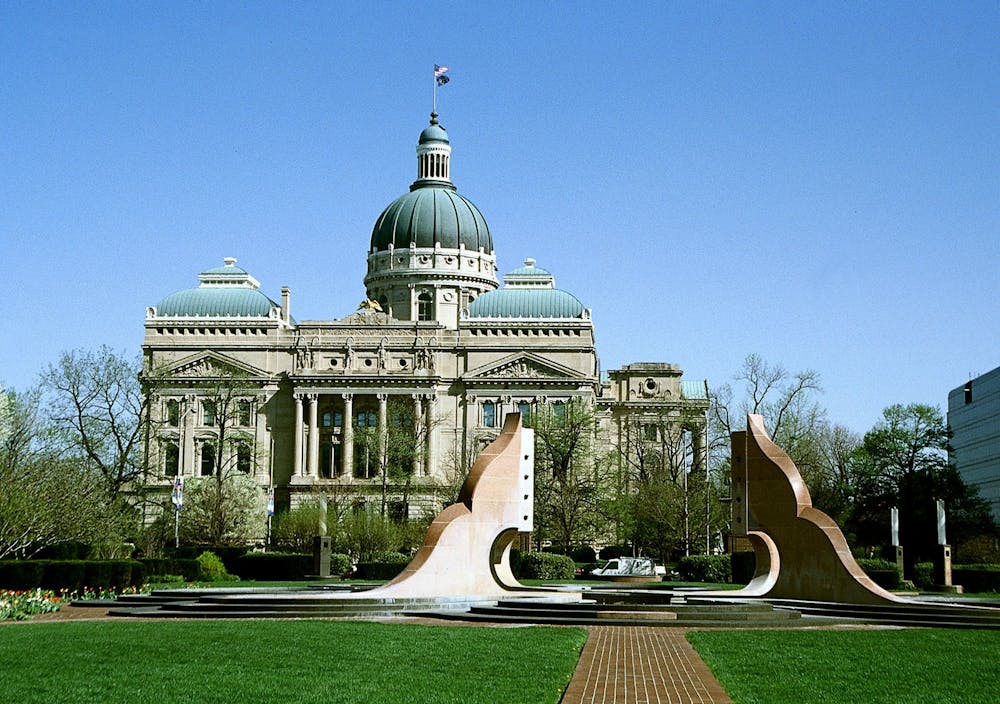During the November 2020 election, my family and I stood in a long line — in the cold — to vote in Indianapolis. Amid a worsening coronavirus pandemic, we were required to risk in-person interaction and go through seemingly unnecessary hoops to vote, such as showing a photo ID while wearing a mask.
Indiana’s political system only works for the Republicans in power. To make the state government work for everyone, Hoosiers need to increase voting accessibility, hold politicians accountable and build community.
This legislative session, the Indiana legislature’s Republican supermajority shot down multiple bills proposed by the Democratic minority aiming to fix some of the voting issues in the state, ranging from same-day voter registration to no-excuse absentee voting. Beyond just blocking progress, the Republican Party is gaming the system to make it even harder to vote.
Access to voting in Indiana is poor, Liane Groth Hulka, the Fifth District Democratic Party chair, said. There are strict requirements for absentee ballots, voter registration is not automatic and different deadlines exist for in-person voting and absentee ballots.
All of these little obstacles add up to a huge barrier to voters. If we want to be a functional democracy, voting should not be as complicated as it is in Indiana.
“Restrictions to voting in Indiana is like a death by a thousand cuts,” Groth Hulka said. “You’re going to have a government that reflects a small group of people opposed to who we actually are as an electorate.”
Voting access is not Indiana’s only hurdle. Indiana is also plagued with gerrymandering, special interest groups and misinformation.
Gerrymandering, the manipulation of a political boundary to favor one political party, has been attributed to a massive discrepancy between the Republican votes and Republican legislators in the state, said Marjorie Hershey, an IU professor emeritus whose research focuses on politics and elections.
“Although about 40 percent of the total votes in Indiana state legislative elections in 2020 were cast for Democratic candidates, only between 22 and 29 percent of our legislators are Democrats,” Hershey said in an email. “That’s due to very efficient Republican gerrymandering, and it’s expected to happen again next year. The presence of gerrymandering simply doesn’t permit our elections to produce representatives who fairly speak for all their constituents.”
Republican politicians take advantage of the gerrymandered districts and ignore the needs of their constituents, solely looking out for their own interests.
The Indiana House Environmental Committee has not met once this year. There were 13 bills proposed during the legislative session that died after the deadline to hear bills passed on Jan. 13, many of which addressed Indiana’s major pollution problem. Indiana releases more chemicals per square mile than any other state as of 2019, according to the Environmental Protection Agency.
Meanwhile, a bill removing regulations for developers in wetlands was passed in the Senate. The authors of the bill all run companies belonging to the Indiana Builders Association, a key lobbying force for the bill. Special interest groups should not be involved in legislative activity. Otherwise, we end up with legislation designed to help Hoosiers failing and legislation designed to enrich legislators succeeding.
Denying the chance to improve our environmental standards and ignoring environmental management is unacceptable. Why is a developer a higher priority than a child’s exposure to lead in a water fountain?
“At the moment, when we have a majority party whose power is disproportionately great over public policy, then the party’s interest in winning doesn’t have to coincide with the public’s desire for policies.” Hershey said. “That distorts the working of a democratic system.”
Misinformation that drives people to support candidates and policies not in their best interests is also harmful for democracy — and prevalent in Indiana.
Groth Hulka said misinformation is partly due to a loss of local journalism, especially in rural Indiana. Now, local journalism is often replaced by national narratives and misinformation from places like Facebook, creating a lack of accountability for Indiana politicians.
These issues must be addressed for Indiana to become more democratic. Unfortunately, with the recent wave of terrible policy from Republican politicians nationally, this reform will be difficult. We have to try to hold these politicians accountable, but we must also look beyond just voting and also toward community building to create a better Indiana.
“I hope that people don’t just say that the Republicans and the Democrats aren’t doing their jobs and sit on their hands,” Groth Hulka said. “There are still things that we can invest in and support, particularly those community building organizations that are doing good work. That will make us a better state as well.”
Evan Shaw (he/they) is a sophomore studying journalism. He also minors in Arabic and Spanish and hopes to one day become a polyglot.




